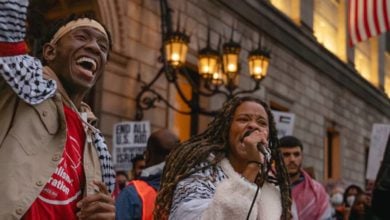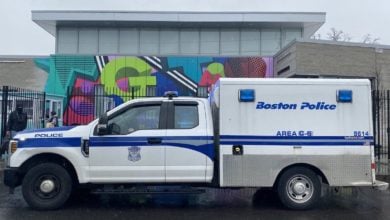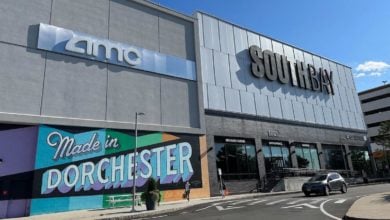Massachusetts has a reputation for progressive policies, especially in health care. It was even ranked the second best state for health care in the country. So why is the Bay State’s COVID-19 vaccine rollout one of the sloppiest?
Massachusetts Governor Charlie Baker blames a limited supply of vaccines from the federal government and looks to the just-announced supply increase for the solution. He is not entirely wrong. The COVID-19 response from the U.S. government has been disastrous compared to countries like China and Cuba who took more sweeping, centralized actions at the start of the pandemic.
But Baker is not correct to shift all of the blame to the federal government. Massachusetts’ vaccine allotments are no more stringent than many other states, with roughly 46,000 doses per 100,000 people. The truth is Massachusetts residents are facing major delays getting vaccinated because the Baker administration prioritized a privatized response.
This decision lined the pockets of for-profit companies like Cambridge Innovation Center, Curative, and LabCorp, the three corporations given zero-bid contracts to develop Massachusetts’ vaccine infrastructure. CVS, Walgreens, and other retail pharmacies were given similar contracts. State-guided emergency plans were abandoned, and tax dollars spent on public medical infrastructure were wasted. Meanwhile, working-class communities of color have been left behind in what is being called “vaccine redlining.”
Failures in each ‘phase’
The pandemic response has been split into phases to stagger vaccinations across different demographic groups. The intention was that higher-risk groups would be prioritized in the earlier phases.
Phase 1 was deliberately slow. It supposedly focused on populations with high mortality rates and those directly working with them. Despite this claim, most frontline workers were ineligible.
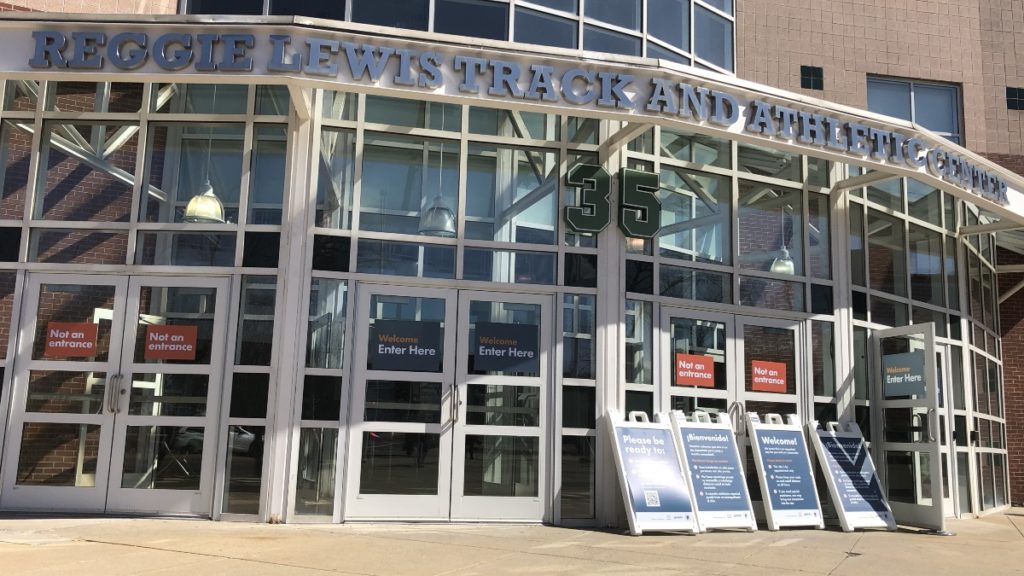
Governor Baker insisted that it was an issue of equity, prioritizing prisons where a COVID-19 outbreak could be more deadly. In truth, counties still reported prison vaccination rates as low as 9 percent and many inmates were ill-informed about the vaccine’s safety. Some reported only getting 30 minutes to review written material with no avenue to ask questions and find out if the vaccine could interact with allergies or pre-existing conditions.
Phase 2 had minor improvements over the first phase. The widely criticized scheduling website was updated and eligibility opened up slightly. But despite the broader eligibility criteria, racial disparities have grown more pronounced.
The dominant metric for vaccination eligibility — elders aged 75 and over — prioritizes wealthier, white communities. “What is the life expectancy in Roxbury, Mass., a majority Black community and one of the areas hardest hit by COVID?” questioned Allister Martin, a Massachusetts General Hospital ER doctor. “Fifty-nine years. This is how you ingrain health inequities.”
Other states use different, more equitable criteria. Rhode Island uses zip codes. Massachusetts data shows higher mortality rates in zip codes where there is “racialized economic segregation,” yet the Baker administration has ignored these findings.
When Phase 3 opens eligibility to residents over 16 in mid-April, the privatized vaccine infrastructure will repeat the same inequity across age groups.
Private clinics put money over public safety
A major vaccination initiative, MassVax, has sites that are mostly in the suburbs and only accessible by highway. Their corporate contracts prioritize raw numbers, not demographic equity. Every week Curative has pulled in over $95,000. LabCorp made over $780,000, and CIC Health has raked in over $1,000,000.
Some MassVax sites are carefully labeled as “locally trusted delivery systems.” These are not clinics run by local boards of health, but rather local branches of companies like CVS or Walgreens with no ties to the communities in which they operate.
Through these sites, Baker has absolved himself of any responsibility to working-class communities and people of color. His administration claims it is the role of retail pharmacies to prioritize communities that have been impacted disproportionately by the pandemic. With scant oversight, appointments go largely to white suburbanites from towns farther away rather than the high-risk populations they are intended to serve.
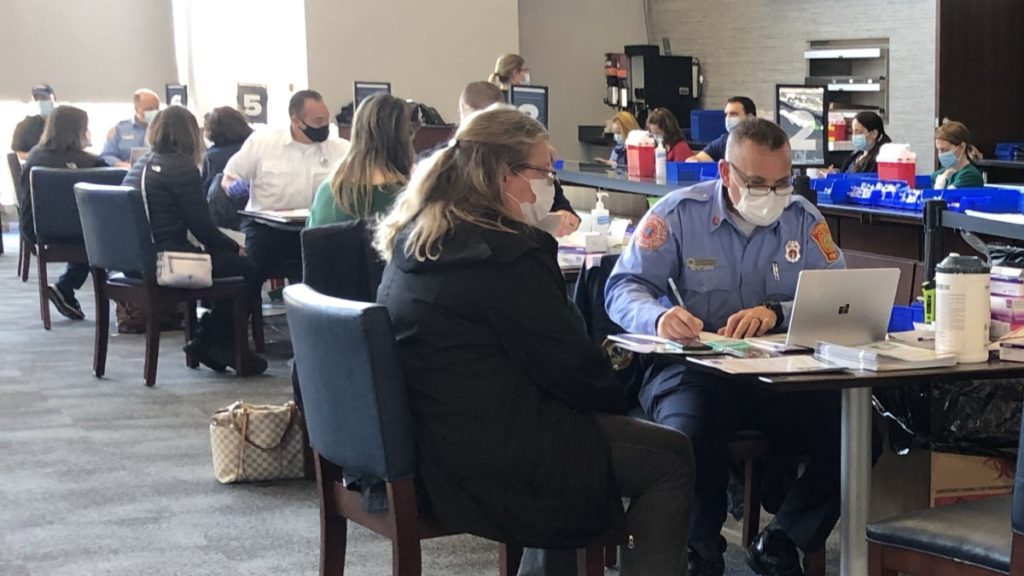
The alternative to MassVax or CVS are hospital-run clinics. Yet, many of these clinics had their vaccine supply cut off and redirected to the private MassVax sites. Massachusetts Attorney General Maura Healey called this abandonment of hospitals a “tragedy,” noting that, “shifting shots to MassVax sites and away from hospital and clinical infrastructure increases racial disparities.”
Few local clinics remain. “The whole point of these centers opening here is that it’s supposed to hit communities affected by COVID-19,” explains Andira Alves, an administrative worker at clinics in Chelsea and Dorchester. “At a private facility, it’s about who has a primary care provider, who has a cell phone and who has the time to come in during the day. I started keeping a tally. We see between 350 and 600 people a day. Around 12 of them are Black. If we did it by zip code it would be better for the neighborhood. Or by profession for frontline workers. The age bracket’s an arbitrary gauge of who is most unsafe.”
Lack of communication between MassVax sites and local clinics means that unused doses can’t be relocated and run the risk of going to waste. “Each vial holds seven doses, and we try to use them all,” Alves says, “We run a waiting list at the end of the night. … I’ve seen people who can’t get an appointment wait hours just to see if the waitlist can give them a shot.”
A better plan exists
Since 2001, Massachusetts developed public-health emergency infrastructure at the state, regional, and local levels. Protocols to store vaccines that require cold-chain storage like the Pfizer and Moderna vaccines already exist. They went ignored in favor of MassVax and lining Gillette Stadium with cold-chain freezers.
Lack of personnel could have been addressed by deploying the National Guard, as 16 other states did as far back as mid-January. Baker refused to deploy the Guard. “If we can get this stuff done without them, we’ll do it that way. I don’t start with an assumption that that’s where I go first.”
During the nationwide rebellions in the wake of the police murder of George Floyd, Baker preemptively called hundreds of National Guard troops in order to suppress peaceful protesters — but will not call on them now to save lives.
The only remnant of Massachusetts’ public-emergency infrastructure are 11 regional collaboratives serving mostly low-density counties in rural Massachusetts. Vaccination rates per capita are highest in these counties, and similarly funded and supplied local clinics could have been just as effective. As they were, local health boards successfully vaccinated their constituents in small groups before they were forced to combine into regional collaboratives and open up to the whole state. This move negated any positive impact on marginalized communities and catered to wealthier white suburbanites.
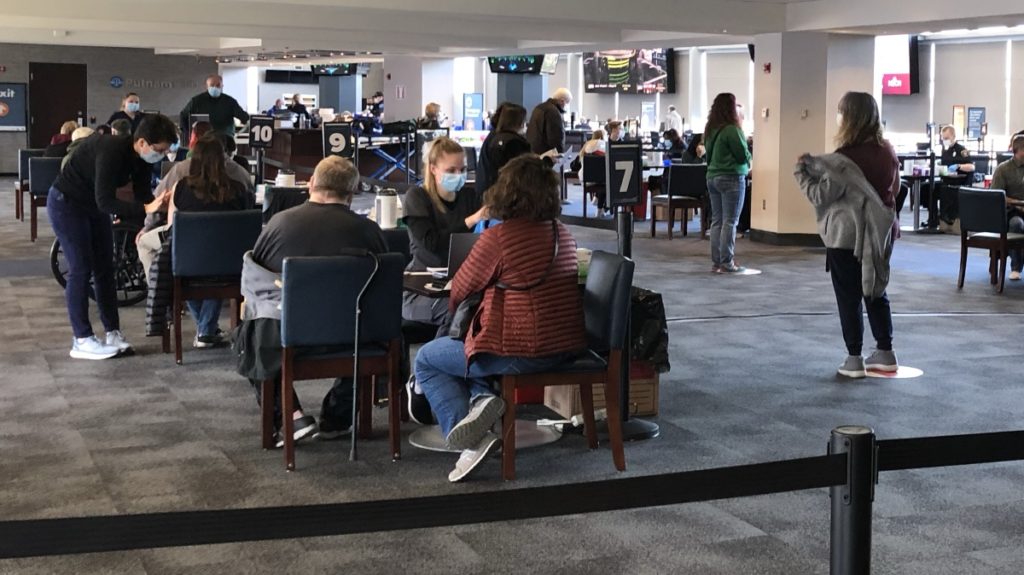
Only two collaboratives are part of the Targeted Outreach Initiative that claims to address the 20 municipalities most impacted by COVID-19. Hard-hit cities like Brockton and Framingham have been forced to organize their own vaccination sites, with little-to-no material or logistical support from the state government.
Resources have instead gone to the floundering “Trust the Facts, Get the Vax” outreach campaign. The material fact is that without local public infrastructure, poor, Black, and brown people lack access to trustworthy medical providers. At the same time, CVS and the Mass Vax sites remain overbooked by those with personal transportation, reliable internet and flexible work schedules.
A nationwide failure
The failure in Massachusetts is a reflection of the failure of U.S. capitalism, which turns disaster relief into decentralized chaos as 50 states and a toothless federal government cut deals with corporations.
Liberation News spoke to Dave Alfonso, who described his vaccination at one of the few FEMA sites in New York as “hyper efficient.”
“I was able to get an appointment without a hitch. … I was in and out in twenty minutes,” the Brooklyn teacher said, “All I had to do was show my ID. … As they gave me the shot they handed me a card with the new vaccine date on it.”
The Massachusetts Education Justice Alliance is currently petitioning the governor to push back the full-time reopening of schools to at least the end of April, which would allow teachers more time to find a vaccine. Teachers were not eligible for the vaccine in Massachusetts until President Joe Biden’s executive order in early March, and most are still struggling to book appointments.
“I had to sit on the website for hours over the course of several days to get the appointment I got,” cemetery worker Josh Savory told Liberation News. “Frankly, for as progressive the state claims it is, especially in the realm of technology, the fact that the Mass. government can’t operate a simple scheduling website is embarrassing. You can get a PS5 easier than a COVID vaccination.”
Under socialism, a centrally planned economy could produce enough vaccines to address the supply issues Governor Baker blames for all of Massachusetts’ problems. The military could be deployed not to fight endless imperialist war, but to combat COVID, like the Chinese People’s Liberation Army built and staffed hospitals. Instead, corporate bosses rake in millions while poor and working people pay the price.


